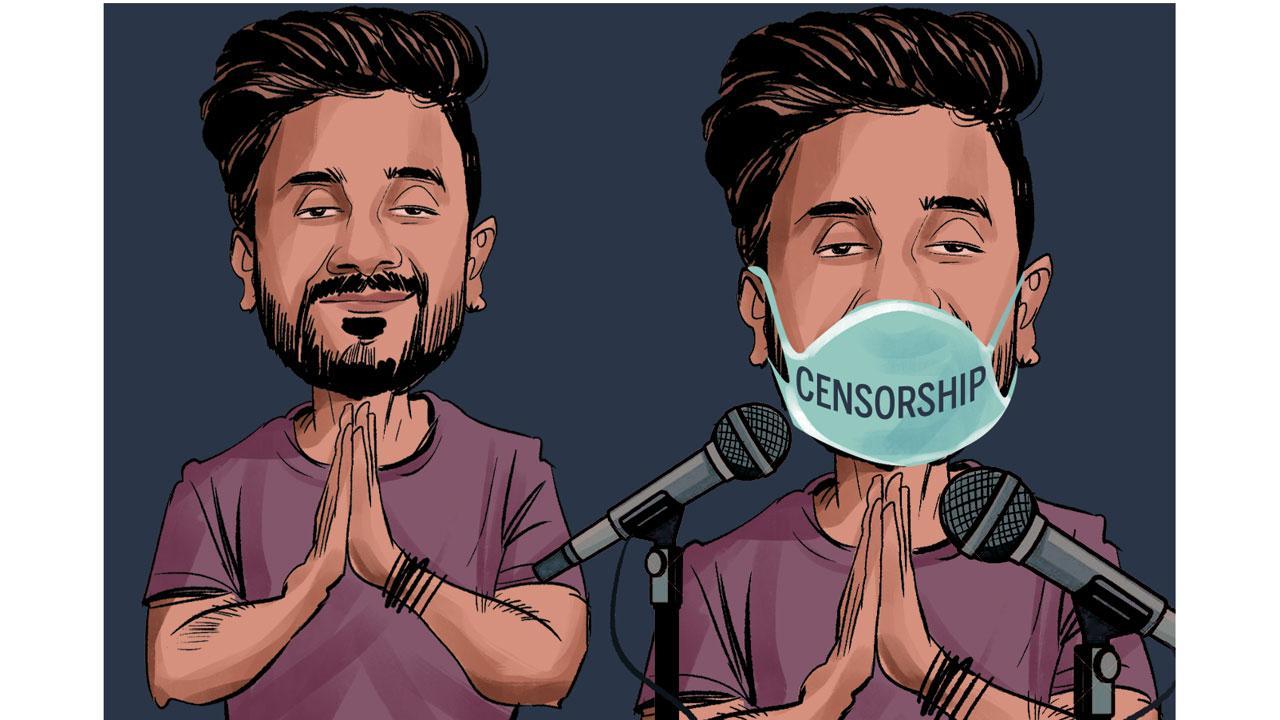Opposing censorship of a work often becomes conflated with supporting the work itself

Illustration/Uday Mohite
![]() The most obvious problem of censorship is that it comes in the way of freedom of expression and information as well as free and meaningful debate. It is undoubtedly wrong to file cases against the comic Vir Das because of his declamation at the Kennedy Centre, as is the escalating persecution of many comics and artistes in recent years.
The most obvious problem of censorship is that it comes in the way of freedom of expression and information as well as free and meaningful debate. It is undoubtedly wrong to file cases against the comic Vir Das because of his declamation at the Kennedy Centre, as is the escalating persecution of many comics and artistes in recent years.
But censorship has another, more insidious problem. Opposing censorship of a work often becomes conflated with supporting the work itself. Censorship provides work a halo of political significance. Art becomes reduced to being repeated illustrations of pre-existing political positions, rather than offering new positions and perspectives from which to intuitively understand life and reality. Works then fall on one side or other of a divide, thus maintaining the polarisation of opinions rather than informing or deepening opinions and understandings.
While supporting Mr Das’s right to expression, I do have discomfort about his words. In (expensive) schoolboy elocution style, Mr Das’s speech/poem played on the idea of there being two Indias. Are there really only two Indias? Mr Das said he comes from “an India where we have maids and drivers but want to come here (the US) to do their job”. After cringing, one might argue that his staff do not quite inhabit the same India as he does, nor should he choose to speak for them, and people ‘like us’ may not come off too well in a two Indias number from their perspective. Analogous to this cliche of ‘two Indias’ is that other lament “this is not my India”. Well, India is not ‘yours’, one feels like saying. Many ideas of India, some of them contradictory, are entangled to make up the reality we inhabit. This cliche of two Indias is homogenising, elitist and conservative, for it keeps the conversation locked in a status quo, where you are the good guys, hence unquestionable. All debates become a matter of victory and defeat (my India is better than your India). How is change possible in such a tug of war?
It’s true that today we confront a steam-rolling and violent right-wing culture. But perhaps as important—and intertwined with it—is the culture of binaries we are constantly being locked into by many things, including social media algorithms. Is the purpose of art, in such times, only to reflect and reinforce these binaries—though this ensures visibility? Or could we turn to art to liberate us from binaries by offering a playground for new imaginations—three, four, hundred Indias—its ability to hold contradictory truths, and reflect emotional and political complexities?
In one sense, works of art are also works of love, as they pay attention to what exists beneath the surface, outside the boundaries drawn for us by privilege and power, and our own limited understanding. If we want to heal the polarisation of our times we might do well to search for ways that lead us away from binaries.
In Gurugram, a gurudwara and a Hindu businessman both offered space to Muslims for namaz, when right-wing groups prevented them from praying in public. “I read about what was happening in the news and wanted to do anything I could to reduce the ongoing conflict between right-wing groups and Muslims” said the businessman. It is acts of love we need, for an antidote, more than acts of cleverness.
Paromita Vohra is an award-winning Mumbai-based filmmaker, writer and curator working with fiction and non-fiction. Reach her at paromita.vohra@mid-day.com
 Subscribe today by clicking the link and stay updated with the latest news!" Click here!
Subscribe today by clicking the link and stay updated with the latest news!" Click here!








